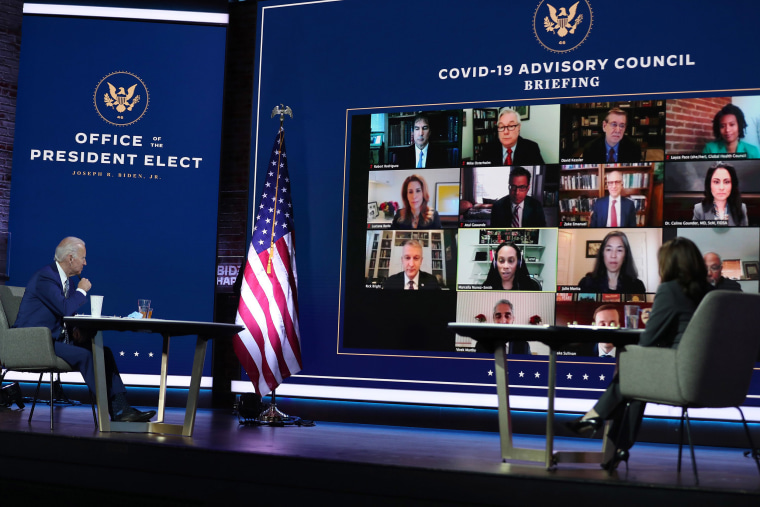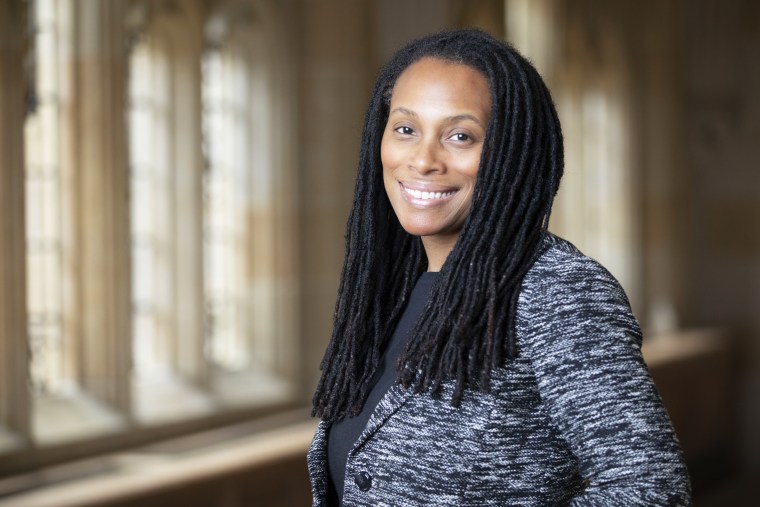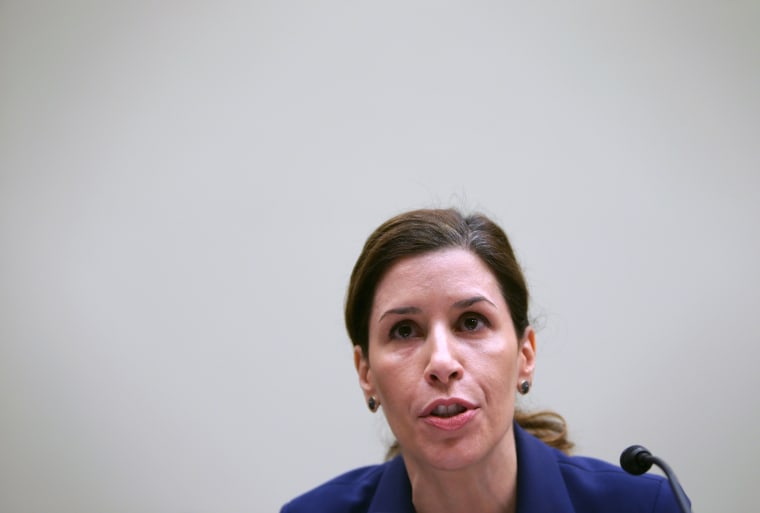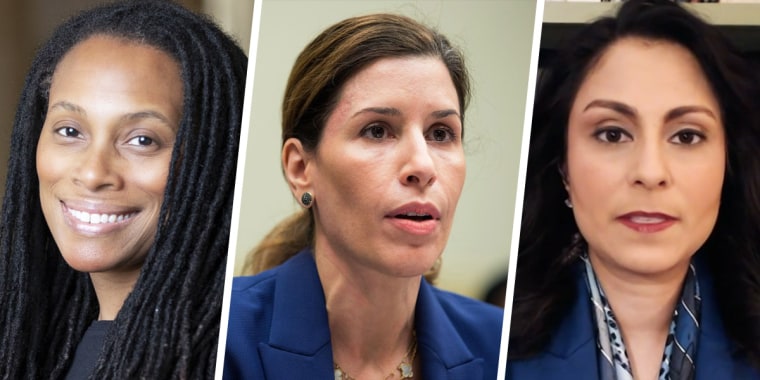Incoming vice president-elect Joe Biden wants to make Covid-19 history — and he has selected a team that includes some of the nation's top female public health experts — to do just that.
The women make up roughly half of the group of leading public health experts tasked with helping Biden, Vice President-elect Kamala Harris and their transition team as they prepare to tackle the virus on day one of Biden's presidency.
"Integrating those diverse perspectives is a strength because it helps us identify the fissures and the fractures that we should fix to be a stronger country together," said Dr. Nahid Bhadelia, an infectious diseases physician and medical director of special pathogens units at Boston Medical Center.
Dr. Bhadelia continued, "You don't see injustices and you don't see barriers unless you understand the point of view that you're trying to represent.” She recounted learning that lesson from former Surgeon General David Satcher during a speech he made in Boston's Faneuil Hall, and it came to her mind when she saw the list of people named to Biden's advisory board. "[He said] it's not just where you sit at the table, but it's what you bring to it."
RELATED: How the Biden Administration could mark a 'turning point for women'
Bringing more women to the table is a philosophy Biden appears to be implementing in his choice of senior leaders throughout his administration, starting with his groundbreaking pick of former Sen. Kamala Harris, the first woman of color to appear on a major-party presidential ticket, as his V.P. He also selected an all-female White House communications team, and named four women to top roles on his economic team, including the country's first female Treasury Secretary.
And now, of course, his Covid-19 task team.

Dr. Marcella Nunez-Smith, an expert on healthcare equity for marginalized communities, is one of three co-chairs on Biden's Transition COVID-19 Advisory Board.
Also included is FDA and National Security Council veteran Dr. Luciana Borio; HIV and tuberculosis expert and former NYC Department of Health Assistant Commissioner Dr. Celine Gounder; Dr. Julie Morita, executive vice president of the Robert Wood Johnson Foundation and former head of the Chicago Department of Public Health; and Loyce Pace, executive director and president of Global Health Council.
More recently, Biden announced three additional members of the Advisory Board, including two women: Jane Hopkins, a former executive vice president of the SEIU who is also trained as a nurse specializing in mental health; and Jill Jim, executive director at Navajo Nation Department of Health.
Those seven women are working with nine men to hone the Biden Administration's approach to eradicating Covid-19. Members of the Advisory Board and others chosen by Biden will lead his administration's response to the virus, replacing the Trump team led by Vice President Mike Pence, Secretary of Health and Human Services Alex Azar, Dr. Deborah Birx and Dr. Anthony Fauci.
When Trump announced the formation of his own Task Force on January 29, 2020, not one woman was included among the 12 original members. Dr. Birx was added as Task Force Coordinator in February.
Defeating the virus won’t be an easy task, with the virus already killing more than 280,000 Americans, with experts predicting the most difficult days ahead as winter approaches. Not to mention, the team will be tasked with implementing an unprecedented vaccine distribution effort — Biden’s only hope for managing the crisis going forward.
“We can't forego the important work that needs to be done between now and then to get our country through the worst wave yet in this pandemic to reduce the spread, to save lives,” Biden said at an event announcing his task force last month. The public health experts he selected will be charged with helping his presidential transition team implement his campaign’s seven-point plan to defeat the virus, turning it into “a blueprint that we can put in place as soon as Kamala [Harris] and I are sworn in office in January.”
Members of Biden’s transition advisory board would be prime picks to take center stage on his future White House task force. Among them are a diverse slate of experts with varied professional focus areas and personal backgrounds.
“The way that the task force members were chosen really represents the challenges that we face during this pandemic,” Bhadelia said. She pointed to task force members who are subject matter experts on emerging infectious diseases, on medical countermeasures and with prior government experience.
Dr. Marcella Nunez-Smith is one of 3 co-chairs on the advisory board and brings deep expertise in the issue of healthcare equity for marginalized communities. The Covid-19 pandemic has disproportionately affected Blacks and Latinos in the United States, with infection rates and deaths among people of color surpassing the rates of their white counterparts, and exceeding their share of the population. Dr. Nunez-Smith is an associate professor of medicine and epidemiology at the Yale School of Medicine, and she is also the Associate Dean for Health Equity Research there. She is the founding director of the Equity Research and Innovation Center.

“The numbers are really striking,” Bhadelia, who is also an MSNBC contributor, said about Black and Hispanic death and case rates, which have remained disproportionately high since April and continue to exceed their population share. “It comes from valid reasons, both the structural racism that exists in our healthcare system currently, but [also] the historic scars of our own government’s experimenting on the African-American community,” she said, referring to the 1930s study known as the Tuskegee experiment in which medical researches experimented on Black men in rural Alabama for decades, with savage disregard for their health.
“So having an understanding of not just how we fix the structural problems, but how we engage with all the different communities in our country to reach our common goals” is key, Bhadelia said, especially as the U.S. devises a roll-out plan for vaccines. A declining number of Americans say they’ll get the vaccine as soon as it becomes available, which may reflect distrust in the Trump administration’s regulatory approval process. According to the survey by STAT and The Harris Poll, there was an even sharper drop in who would be interested in getting the vaccine among Black Americans.
“What it requires for people to take the vaccine is community engagement, it takes the hard work of understanding what the barriers are, listening to communities, having language-specific and culture-specific outreach,” said Bhadelia, who worked on managing the Ebola outbreak in 2014.
The task force also includes Dr. Celine Gounder, a clinical assistant professor at the NYU Grossman School of Medicine. She spent 14 years studying tuberculosis and HIV in South Africa, Lesotho, Malawi, Ethiopia and Brazil and directed a Gates Foundation-funded group focused on responding to those epidemics. She has also served on the NYC Department of Health.
“I think we need to understand that we are at war, we are at war with this virus,” Gounder recently said on MSNBC’s “AM Joy.” “This is a national security threat, just like any other national security threat would be whether it's a terrorist attack or being an armed conflict with another country.”
The task force also includes Dr. Luciana Borio, who hails from the information technology industry and specializes in biodefense, emerging infectious diseases, medical product development, and complex public health emergencies. She has held senior leadership positions at the FDA and National Security Council.

Dr. Julie Morita is executive vice president of the Robert Wood Johnson Foundation and was previously the medical director, chief medical officer and commissioner at the Chicago Department of Public Health. She also served on the CDC’s Advisory Committee on Immunization Practices, and the National Academy of Sciences’ Committee on Community Based Solutions to Promote Health Equity in the United States.
Loyce Pace, the executive director and president of Global Health Council, and specializes in promoting access to essential medicines and health services. Over the course of her career, Loyce has championed policies for access to essential medicines.
On Nov. 28, Biden added two more members to the advisory board: Jane Hopkins, the former Executive Vice President of the SEIU who currently serves on Washington State's COVID task force. Born in Sierra Leone, Hopkins immigrated to the U.S. two decades ago. Jill Jim, Ph.D., focuses on the health disparities that exist among American Indians and Alaska Natives in the Navajo Nation, where she serves as executive director of the Department of Health.
“I think part of the issue that we’ve seen with this response is you had an administration that didn't understand how you could leverage the strength and the power of our existing resources for the public good,” Bhadelia said. “And having people who've been in a functional public health response and governance in the past [has] that added benefit of people who know how science and governance work together.”
